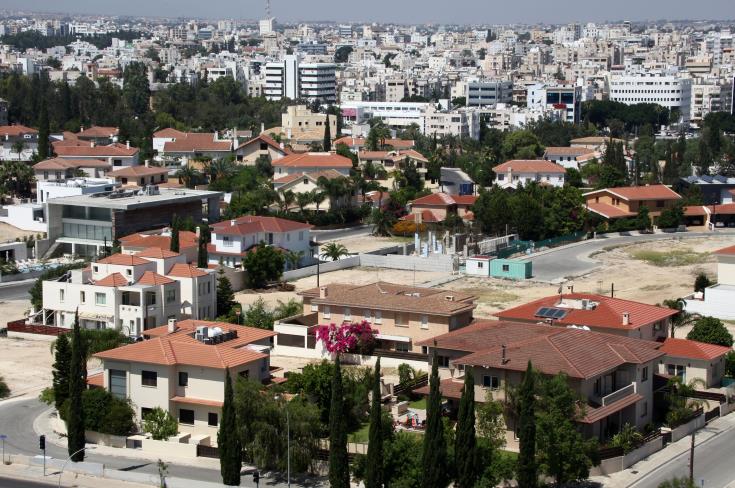Cyprus real estate agents fear that house prices could be pushed downwards from pressure on banks by the European Central Bank to sell-off property they have acquired through debt to asset swaps or foreclosures.
Taking on properties in exchange for debt has helped the Cyprus banking system reduce toxic loans from €28 bln in 2014 to under €8 bln in March 2020, just before the coronavirus outbreak.
The once praised method of debt-to-real estate exchange helped Cyprus banks bring down their Non-Performing Exposure.
It could now have a “boomerang” effect as banks are forced to pay penalties and make higher provisions.
Directives from the European Banking Union state that banks cannot hold on to a property they acquire through foreclosures or debt-to-asset agreements for more than three years.
In the event banks fail to sell the property acquired, they can apply for an extension for no longer than 1-2 years, or penalties will be imposed.
Looking at Bank of Cyprus’ results for 1H 2020, the bank has included provisions of €21 mln for properties that were not sold within the timeframe foreseen by the regulations.
Other banks that invested in the “debt-to-asset” swaps are expected to follow the same path.
Real estate experts are worried that pressure from monetary authorities will force banks to offload their properties either by directly selling them to the market through asset management companies or packaging more asset-backed loans to investment funds.
In comments to the Financial Mirror, Panos Danos CEO of Danos / BNPRE Group said he expects to see banks trying to offload properties on the market, exerting pressure on already flat prices.
“On the one hand you have the pressure exerted on Cyprus banks by the ECB, and on the other, following the coronavirus crisis, banks are back on a money-losing path.
Combined, these two elements will push banks to try and get rid of assets that will cause them more loses and provisions,” said Danos.
He argued that with the threat of sanctions from the ECB hanging over their heads like the sword of Damocles, banks will have to dump properties.
Danos said real estate agents understand the banks’ side, noting that they are not charitable organisations and people taking out loans should be more committed when it came to paying them off.
“Now, it is only natural that when these properties are essentially forced to find their way on the market, supply will go up with downward pressure on prices increasing.”
Property overload
As banks already have a considerable property portfolio building up, NPLs are expected to increase as wages are forced down in the aftermath of coronavirus.
The Central Bank of Cyprus in its latest Financial Report said it expects to see an increase in NPLs once a freeze on loan repayments introduced by the government expires.
“Once the freeze on foreclosures is lifted in October and loan payments reinstated from next year, it is expected that banks will want to make use of their artillery in bringing down their NPEs,” Danos said.
This could see banks acquiring more properties, possibly increasing supply even further.
“Just the damage Cyprus has suffered from international reports on our Citizenship for Investment scheme is enough to push prices downwards. Let alone, the increase in unemployment, tensions in the region.”
Chairman of the Cyprus Property Owners Association George Mouskides told the Financial Mirror that he too is worried about falling prices.
Mouskides is not so much concerned over growing repossessed property portfolios of the banks, as he is about the sale of asset-backed bad loans to investment funds.
“Banks have been very reasonable and cautious so as not to cause damage or crash the market,” said Mouskides.
He said it is not clear how investment funds will behave, but he believes the scenario of funds wanting to sell off their portfolios at values much lower than the market rate is not a plausible one.
“Prices will definitely be pushed down in any case, but at the same time construction costs are increasing, which will probably level things out.”
A banking sector source noted that banks have been careful in the way they managed their property portfolios, not wanting to bring down prices, inflicting further damage to the sector.
“We do understand real estate concerns, and they do have valid arguments. However, even if banks wanted to offload their properties it would bring about further damage for the banking system,” argued the source.
He said a sudden drop in property prices would also mean that the value of properties under their management, or those tied to a loan agreement, would also lose value.
“This would lead monetary institutions to force banks to increase provisions.
If the whole sector is deemed to be risky, then international bodies like the ECB would come down hard on the banks, forcing them to further increase provisions as the value of properties in their portfolio could well go up in smoke.”
“Banks intend to put pressure on strategic defaulters, concentrating on cases that are old, some dating from decades back, which are not the result of the coronavirus pandemic”.
The source said that representatives from the ECB will be visiting Cyprus as part of the Troika of international lenders.
“We cannot have them find that we are not making use of tools like foreclosures in our struggle to bring own our NPL portfolios.”










